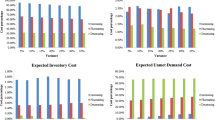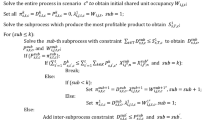Abstract
In this paper, we address the problem of both releasing and scheduling of lots in a wafer fab. In the lot release problem, we determine the number of lots of different products to be released in each period of a planning horizon in order to minimize total tardiness. The problem of the scheduling of lots at various workstations is modeled as a mathematical program for the objective of minimizing the cycle times of the lots and is solved by the Lagrangian relaxation method. Computational results are presented that exhibit that our methodology constantly generates better solutions compared to those obtained by commonly-used dispatching rules.
Preview
Unable to display preview. Download preview PDF.
Similar content being viewed by others
References
Uzsoy, R., Lee, C.Y., Martin-Vega, L.: A review of production planning and scheduling models in semiconductor industry – part I: system characteristics, performance evaluation and production planning. IIE Transactions, Scheduling and Logistics 24, 47–61 (1992)
Uzsoy, R., Lee, C.Y., Martin-Vega, L.: A review of production planning and scheduling models in semiconductor industry – part II: shop-floor control. IIE Transactions, Scheduling and Logistics 26, 44–55 (1994)
Hung, Y.F., Leachman, R.C.: A production planning methodology for semiconductor manufacturing based on iterative simulation and linear programming calculations. IEEE Transactions on Semiconductor Manufacturing 9(2), 257–269 (1996)
Lee, Y., Kim, S., Yea, S., Kim, B.: Production planning in a semiconductor wafer fab considering variable cycle times. Computers in Industrial Engineering 33(3), 713–716 (1997)
Golovin, J.J.: A total framework for semiconductor production planning and scheduling. In: Solid State Technology, pp. 167–170 (1986)
Wein, L.: Scheduling semiconductor wafer fabrication. IEEE Transactions on Semiconductor Manufacturing 1(3), 115–129 (1998)
Kim, Y., Kim, J., Lim, S., Jun, H.: Due date based scheduling and control policies in a multi-product semiconductor wafer fabrication facility. IEEE Transactions on Semiconductor Manufacturing 11(1), 155–164 (1998)
Lu, S., Ramaswamy, D., Kumar, P.R.: Efficient scheduling policies to reduce mean and variance of cycle time in semiconductor manufacturing plants. IEEE Transactions on Semiconductor Manufacturing 7(3), 374–388 (1994)
Sarin, C.S., Shikalgar, S., Shenai, V.: Modeling and analysis for the reduction of cycle time at a wafer fab. In: Proceedings of the International Conference on Semiconductor Manufacturing Operational Modeling and Simulation (2001)
Graves, S., Meal, H., Stefek, D., Zeghmi, A.: Scheduling of re-entrant flow shops. Journal of Operations Management 3(4), 197–207 (1983)
Mehta, S.V., Uzsoy, R.: Minimizing total tardiness on a batch processing machine with incompatible job families. IIE Transactions 30, 165–178 (1998)
Pinedo, M.: Scheduling: Theory, Algorithms and Systems. Prentice-Hall, Englewood Cliffs (1995)
Baker, K.R.: Introduction to Sequencing and Scheduling. John Wiley & Sons, Chichester (1974)
Shenai, V.: Releasing and scheduling of jobs in a wafer fab. Master thesis, Virginia Polytechnic Institute and State University (2003)
Weiss, G.: On optimal draining of re-entrant fluid lines. In: The IMA Volumes in Mathematics and its Applications, Stochastic Newtorks, vol. 71, pp. 91–103 (1995)
Fisher, M.L.: The Lagrangian relaxation method for solving integer programming problems. Management Science 27(1), 1–18 (1981)
Author information
Authors and Affiliations
Editor information
Rights and permissions
Copyright information
© 2007 Springer Berlin Heidelberg
About this paper
Cite this paper
Sarin, S.C., Shenai, V.D., Wang, L. (2007). Releasing and Scheduling of Lots in a Wafer Fab. In: Kao, MY., Li, XY. (eds) Algorithmic Aspects in Information and Management. AAIM 2007. Lecture Notes in Computer Science, vol 4508. Springer, Berlin, Heidelberg. https://doi.org/10.1007/978-3-540-72870-2_11
Download citation
DOI: https://doi.org/10.1007/978-3-540-72870-2_11
Publisher Name: Springer, Berlin, Heidelberg
Print ISBN: 978-3-540-72868-9
Online ISBN: 978-3-540-72870-2
eBook Packages: Computer ScienceComputer Science (R0)




